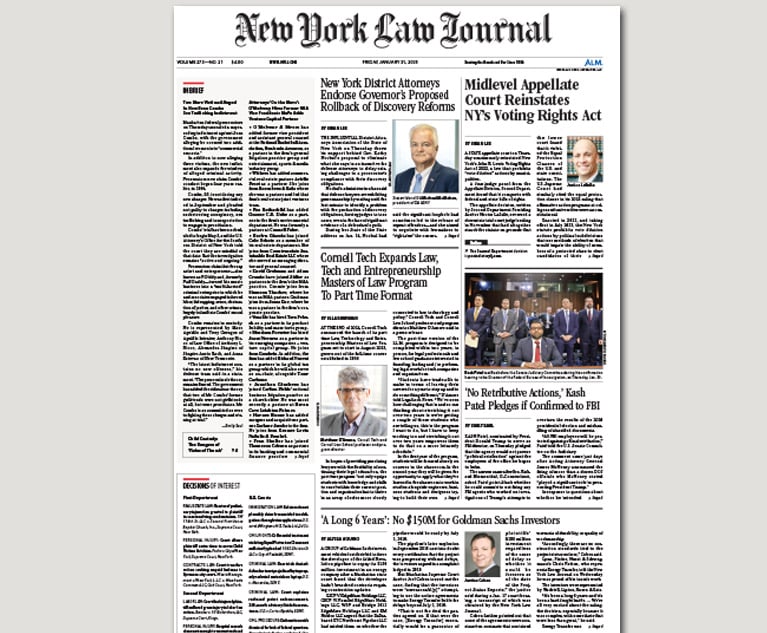 Judge Gerald J. Whalen, Appellate Division, Fourth Department. Courtesy photo
Judge Gerald J. Whalen, Appellate Division, Fourth Department. Courtesy photo Rules of Etiquette Indirectly Reflect Issues of Morality
More than 275 years ago, a young George Washington put pen to paper to copy down 110 Rules of Civility and Decent Behavior. Found in a copy book, the original source of these rules remains unsettled, although scholars note the similarity with a French Jesuit work on etiquette for young men originally published in the 16th century.
May 01, 2023 at 09:45 AM
5 minute read
Legal ServicesMore than 275 years ago, a young George Washington put pen to paper to copy down 110 Rules of Civility and Decent Behavior. Found in a copy book, the original source of these rules remains unsettled, although scholars note the similarity with a French Jesuit work on etiquette for young men originally published in the 16th century. These rules provided not only a critical penmanship exercise for young Washington but were also arguably formative to the development of our first president's character, accidently or not. Indeed, Richard Brookhiser, in his preface to a more recent publication, posits that the rules helped "form the inner man (or boy) by shaping the outer" (Brookhiser, Richard, Introduction, Rules of Civility: the 110 Precepts that Guided Our First President in War and Peace by George Washington, University of Virginia Press 2003. pp 1, 4).
The content of Washington's writing exercise, viewed through today's eyes, is at times humorously antiquateds—it has been a while, I would suspect, since we needed a reminder to "cleanse not [our] teeth with the table cloth" (Rule 100) or a warning that "he that makes too much haste to put on his hat does not well" (Rule 27). Nevertheless, many, if not most, of these maxims retain their usefulness today. Indeed, as an appellate court justice, I am admittedly partial to Rule 35, "[l]et your discourse … be short and comprehensive." But most saliently, to my mind, these seemingly inconsequential rules of etiquette are more than just directions on table manners or an insight into the shaping of one of our founders, they also reflect basic tenets of community that continue to resonate today. Indeed, as Brookhiser notes, these rules indirectly reflect issues of morality that warrant continued consideration (Brookhiser, Introduction, pp. 9).
 Portrait of George Washington, 1732-1799, left, painted by Gilbert Stuart, published at the Albion Office in 1844, and "Washington's Rules of Civility and Decent Behavior in Company and Conversation," published in 1888. Photos: Library of Congress
Portrait of George Washington, 1732-1799, left, painted by Gilbert Stuart, published at the Albion Office in 1844, and "Washington's Rules of Civility and Decent Behavior in Company and Conversation," published in 1888. Photos: Library of Congress NOT FOR REPRINT
© 2025 ALM Global, LLC, All Rights Reserved. Request academic re-use from www.copyright.com. All other uses, submit a request to [email protected]. For more information visit Asset & Logo Licensing.
You Might Like
View All
Law Firms Expand Scope of Immigration Expertise Amid Blitz of Trump Orders
6 minute read

Orrick Hires Longtime Weil Partner as New Head of Antitrust Litigation
Trending Stories
Who Got The Work
J. Brugh Lower of Gibbons has entered an appearance for industrial equipment supplier Devco Corporation in a pending trademark infringement lawsuit. The suit, accusing the defendant of selling knock-off Graco products, was filed Dec. 18 in New Jersey District Court by Rivkin Radler on behalf of Graco Inc. and Graco Minnesota. The case, assigned to U.S. District Judge Zahid N. Quraishi, is 3:24-cv-11294, Graco Inc. et al v. Devco Corporation.
Who Got The Work
Rebecca Maller-Stein and Kent A. Yalowitz of Arnold & Porter Kaye Scholer have entered their appearances for Hanaco Venture Capital and its executives, Lior Prosor and David Frankel, in a pending securities lawsuit. The action, filed on Dec. 24 in New York Southern District Court by Zell, Aron & Co. on behalf of Goldeneye Advisors, accuses the defendants of negligently and fraudulently managing the plaintiff's $1 million investment. The case, assigned to U.S. District Judge Vernon S. Broderick, is 1:24-cv-09918, Goldeneye Advisors, LLC v. Hanaco Venture Capital, Ltd. et al.
Who Got The Work
Attorneys from A&O Shearman has stepped in as defense counsel for Toronto-Dominion Bank and other defendants in a pending securities class action. The suit, filed Dec. 11 in New York Southern District Court by Bleichmar Fonti & Auld, accuses the defendants of concealing the bank's 'pervasive' deficiencies in regards to its compliance with the Bank Secrecy Act and the quality of its anti-money laundering controls. The case, assigned to U.S. District Judge Arun Subramanian, is 1:24-cv-09445, Gonzalez v. The Toronto-Dominion Bank et al.
Who Got The Work
Crown Castle International, a Pennsylvania company providing shared communications infrastructure, has turned to Luke D. Wolf of Gordon Rees Scully Mansukhani to fend off a pending breach-of-contract lawsuit. The court action, filed Nov. 25 in Michigan Eastern District Court by Hooper Hathaway PC on behalf of The Town Residences LLC, accuses Crown Castle of failing to transfer approximately $30,000 in utility payments from T-Mobile in breach of a roof-top lease and assignment agreement. The case, assigned to U.S. District Judge Susan K. Declercq, is 2:24-cv-13131, The Town Residences LLC v. T-Mobile US, Inc. et al.
Who Got The Work
Wilfred P. Coronato and Daniel M. Schwartz of McCarter & English have stepped in as defense counsel to Electrolux Home Products Inc. in a pending product liability lawsuit. The court action, filed Nov. 26 in New York Eastern District Court by Poulos Lopiccolo PC and Nagel Rice LLP on behalf of David Stern, alleges that the defendant's refrigerators’ drawers and shelving repeatedly break and fall apart within months after purchase. The case, assigned to U.S. District Judge Joan M. Azrack, is 2:24-cv-08204, Stern v. Electrolux Home Products, Inc.
Featured Firms
Law Offices of Gary Martin Hays & Associates, P.C.
(470) 294-1674
Law Offices of Mark E. Salomone
(857) 444-6468
Smith & Hassler
(713) 739-1250







